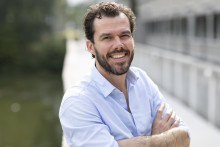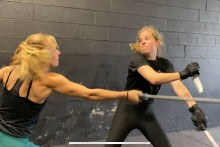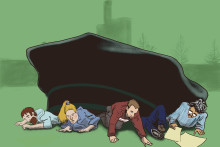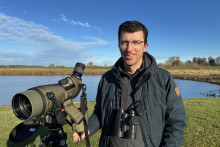Have you ever wondered how burglars choose which houses to rob? That is just one example of the questions Van Gelder’s research might be able to answer. ‘I develop novel research methods using technology and apply them in crime research,’ says the newly appointed Professor of Innovative Methods in Public Safety Research (BMS Faculty) who is presenting his inaugural lecture today.
‘We invite actual burglars who are in prison and ask them to perform a burglary– in virtual reality,’ the scientist describes one of his projects. ‘This allows us to obtain many details we wouldn’t get from verbal statements of these offenders, such as the exact search patterns they employ when they go through a house. This technology allows us to better understand what happens during crime events and the decision making that underlies it, and hopefully it can help us to come up with specific policies to prevent crime.’
‘We invite actual burglars and ask them to perform a burglary in virtual reality’
Professor Van Gelder came to the UT after nine years at the Netherlands Institute for the Study of Crime and Law Enforcement (NSCR) where he conducted research on criminal decision making and initiated the NSCR’s CRIME Lab. Last year he received both the ERC Consolidator Grant and the Vidi grant for his project ‘Crime and Time’, and decided it was time to move his research to a technical university. ‘I wanted to expand the use of technology in my work and this is a natural environment to do so.’
New theory to explain crime
Apart from practical projects, the professor also focuses on theory building. He has developed a new theory explaining crime. Titled ‘Time Frame Theory’, it challenges the existing theories and aims to unify two rival views on criminal behavior. ‘There is an ongoing debate between two views in criminology,’ explains Van Gelder. ‘The sociological or what I would call “sociogenic” view which argues that it’s the environment, or contextual factors, that have the major influence on criminality, while the psychological or dispositional view places the importance on stable individual characteristics.’

The researcher explains that short-term thinking is generally accepted as the main factor leading to criminality. ‘Crime is driven by immediate benefits. People committing crimes don’t tend to focus on distant consequences, they are shortsighted and focus on immediate gratification. The dominant view is that shortsightedness is dispositional in nature and stable over time, that you are either a long-term thinker or a short-term thinker. However, I think it’s much more flexible.’ Hence Time Frame Theory argues that contextual factors, such as neighborhood and family factors and delinquent peers, can trigger short-term thinking leading to crime; and that shortsightedness fluctuates over time.
‘If I’m right and short-term thinking does change over time, we could be able to influence it’
And the new UT professor intends to prove (or disprove) his theory. ‘I will empirically test the theory using data from the z-proso project, an ongoing longitudinal study that follows a large sample of Swiss urban youth. This should allow us to see how short-term thinking develops over time and whether changes in it are consequential for delinquent behavior. We will also work with delinquents who are currently on probation. We will ask them to respond to short surveys via their smartphones several times a day to see if short-term mindset develops over the course of the day.’
‘If I’m right and short-term thinking does change over time, we could be able to influence it,’ says Van Gelder as he introduces the FutureU project which is also part of the ERC Consolidator Grant. ‘Using virtual reality, the project gets young offenders in touch with their future self by having them interact with an aged avatar representing themselves. We believe that by facing their older self, people can become more future oriented. This could be used as an intervention for preventing crime but also other types of self-defeating behavior linked to short-term thinking.’
Pushing the field forward
For Jean-Louis van Gelder it’s important to combine practice and theory. ‘Crime research and theorizing regularly proceed without taking much notice of what happens “on the ground”,’ he mentions in his inaugural speech. ‘There is, in other words, work to be done. Developing new theoretical pathways and exploring the use of novel methods and technologies will prove fundamental in pushing the field forward. It has always been my ambition to work in multidisciplinary teams to develop groundbreaking solutions to address crime-related problems and have real-world impact.’







